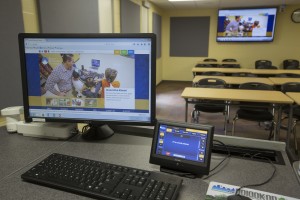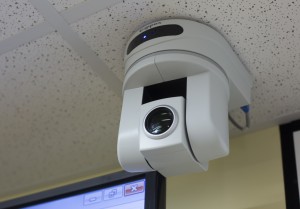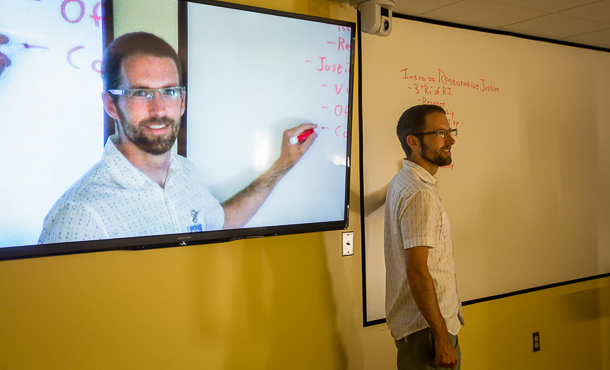Students from around Virginia are getting veterinary technician associate degrees from Blue Ridge Community College though they rarely set foot on campus.
Moms and dads stifled temporally by their work schedules and parenting duties “attend” class at home, at night or on the weekend.
Some Eastern Mennonite University students will earn a degree in a field even though the school doesn’t have a full department in the discipline on campus. All this is made possible by online learning, a growing segment of higher education.
“Our main job is to serve the community, so this gives us another option to serve the community,” said Bob Young, Blue Ridge’s vice president of instruction and student services. “When [online classes] first started, we thought were going to be giving these classes all over world, but most people live within our service area. They’re taking it because it’s a better way for them to get their education.”
With that mission, online learning is a big part of BRCC’s education-delivery system. Young said the school offers about 120 of its approximately 750 total courses, or 16 percent, totally online, and another 18 percent are hybrids with classroom and online facets.
Most online classes are available whenever the student wants to view them, allowing part-time students with busy lives to continue their education. Young said 60 percent of BRCC’s students take courses part time.
EMU and James Madison University offer some undergraduate courses online, but graduate education is where the technological advancement is most used.
Sarah MacDonald, interim senior director of outreach and engagement, said JMU has five master’s degrees and six certificate programs that can be competed entirely online.

(Daniel Lin/Daily News-Record)
EMU is using online learning as a way to add degrees without a full faculty in a field. Provost Fred Kniss said it collaborates with Goshen College in Indiana and Bluffton University in Ohio, schools also affiliated with the Mennonite Church, to offer a master’s degree in business administration and even a new undergraduate offering.
“Last year, we launched a sociology major, with broader access to subfields,” Kniss said. “We went from a faculty of two to a faculty of about six or seven [with the professors at the other colleges].
“I think for small liberal arts colleges, this is going to be part of the wave of the future, to find ways to collaborate with each other to enhance their offerings.”
Tough To Teach
Online courses usually require students to do more than watch a recorded lecture. They can involve chat or discussion board participation, PowerPoint presentations and other methods that facilitate learning.
“The challenge,” said Greg Cook, Blue Ridge’s instructional technologist, “is to create a virtual classroom.”
While an online class might alleviate a student of the burden of being in class at a specific time, that might be the only thing that’s easier. Young said students must be dedicated to meet assignment deadlines.
“If it’s done right,” said Cook, “it’s actually a little bit harder. The instructor probably is going to give you more to do to make sure you’re engaged.”
The same goes for the professor. Instructors, Young said, must have everything for the course ready to go on the first day, respond to student inquiries sent at odd hours, and update the online classroom regularly.
Some courses are synchronous, but most don’t require a student to sign on for class at a specified time.
Just because a student doesn’t need a classroom or a desk, that doesn’t mean the classes are less expensive. Schools must buy software to host online classes, train faculty members to use it effectively, and have enough bandwidth to support the endeavor, said Young.
With education costs rising, however, university officials said online learning might help stem cost increases by allowing schools to serve students in far-flung locales with minimal infrastructure investment.

(Daniel Lin/Daily News-Record)
“I think of it more as way to enhance quality and access for the same price,” Kniss said. “It saves money for the student if he’s not having to move and pay room and board on campus, but it doesn’t really result in lower tuition. … In the long run, it might allow us to grow our enrollment without growing the physical plant, give us a better product to market without expanding our faculty and staff or bricks and mortar.”
Graduate Offerings
Blue Ridge is the most advanced local higher-education institution when it comes to online education, having offered classes via the Internet since 1997. Young said some of its associate degrees can be earned entirely online with the exception of reporting for a proctored exam.
Thanks to online education, students statewide can take BRCC’s veterinary technician course and only report to the Weyers Cave campus for laboratory work. One of only two vet-tech programs in the state, Young said distance-learning students go to one of four sites in Virginia to view lectures via direct video and are under the guidance of an on-site vet tech.
At JMU, MacDonald said many of its online course offerings during the school year are for working adults. It has programs that allow adults to complete degrees as well as graduate-level courses.
“We think of it more of as a way provide access to students who wouldn’t otherwise be able to attend JMU,” said MacDonald. “Offering our programs online provides access to those students and gives us greater reach.”
In the summer, she said, some professors offer courses online so students can continue working toward a degree without being in Harrisonburg, but no undergraduate programs can be completed totally online.
MacDonald said many of the people taking JMU’s online courses are former students, with the vast majority living in the mid-Atlantic region. However, the school does have international students taking classes online.
Though the school began offering online classes for seminary students about 15 years ago, Kniss said it’s “cautiously” expanded such courses over the years.
“We don’t want to be in front of the curve on this, and we don’t want to do anything that would diminish the value of the degree and the quality of education we provide,” he said. “But we do have a strategic interest in providing broader access to an EMU education.”
To do that, Kniss said the university is broadening its online programming for undergraduates and expanding its collaborative offerings with other universities. For example, by taking online courses offered by partner universities as well as classes at EMU, students can earn a collaborative master’s degree in business administration.
Summer school classes for undergraduates, he said, also another potential growth area.
Brian Gumm, online education design specialist for the university, said a number of undergraduate online general education courses that originated at EMU’s Lancaster, Pa., campus now are being offered in Harrisonburg.
Courtesy of the Daily News-Record, Aug. 25, 2015.
